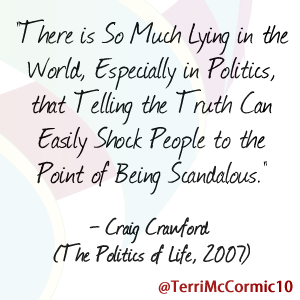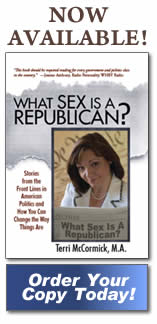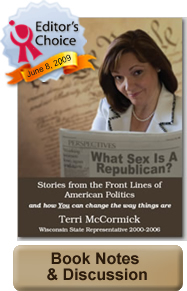 Campaigning is tough business. It takes someone with a lot of inner strength, a lot of community connections and a bit of money to make a solid run for office. Those of us who run “grassroots campaigns” understand just how difficult the road is for those who play by the rules. Yet there exists a breed of politician who does not follow the same road. This chapter is not about political corruption as an ending. Rather, it openly discusses old-style politics as a beginning, reveals the tactics of dirty campaigns and offers voters a strategy to determine a good candidate. It’s an appeal to all of us to do something about it!
Campaigning is tough business. It takes someone with a lot of inner strength, a lot of community connections and a bit of money to make a solid run for office. Those of us who run “grassroots campaigns” understand just how difficult the road is for those who play by the rules. Yet there exists a breed of politician who does not follow the same road. This chapter is not about political corruption as an ending. Rather, it openly discusses old-style politics as a beginning, reveals the tactics of dirty campaigns and offers voters a strategy to determine a good candidate. It’s an appeal to all of us to do something about it!
STAKEHOLDER POLITIC
The political class would have you believe that it is all about ideology—left/right or liberal/conservative—but is it? What if I told you that the political class in both major political parties is only interested in reelection in a quest for power and control? What if I told you that political elections are all about energizing their respective bases by evoking emotional-social issues to signal a particular voting response. Wake up, America, lest we all turn into Pavlovian voting dogs.
Modern interest group politics posed by the political class in both the Democrat and Republican parties represent a stakeholder politic that serves two purposes. First, it provides the campaign cash needed to guarantee the majority party’s position in power. And second, it guarantees access to government for interest groups invested in one political class’ line of thinking over the other. The voters, in many instances, are just obstacles that need to be charged up, like a battery, and then spun in a cylinder, so to speak.
Are there checks and balances to curtail possible abuse of power in public office? Yes, there are constitutional checks and balances, and there are public servants who freely self-limit their terms and walk away from power. Former representative Joe Scarborough (R-Fla.) commented on MSNBC’s Morning Joe on April 1, 2008, “Good government needs two things: term limits and the healthy friction that comes with the constitutional separation of powers between the legislative, executive and judicial branches.”
There is no question: healthy and open debate is preferred to topdown vertical stakeholder standoffs. Silo or vertical politics has resulted in political rancor freezing legislatures across this country. Democrat and Republican unwillingness to put the public’s interests first is an old political culture that must be transformed to a new culture of solving problems.
Politics, in its simplest form, is the distribution of scarce resources. It may represent dollars or gasoline, and it involves two sets of diametrically opposed people engaged in intellectual battle. It may involve interest groups and politicians working to solve great problems for the public’s behalf. In the old-style politic, it was reminiscent of a sixth-grade dance, with one group lining up on one side of the room, and the other group on the other side.
DEMOCRATIC VOTING BLOCKS
Democrats are, in large part, supported by voting blocks of women, minorities and trade and professional union members. From a social perspective, Democrats tend to be pro-choice, pro-environment and pro-government programs. Democrats typically favor a noblesse oblige philosophy, supporting the case that “nobles” (or people of means) must provide for the less fortunate. Southern Democrats throughout the 1800s carried this philosophy from their plantation economies into the Civil War. President John F. Kennedy altered these attitudes in the 1960s.
REPUBLICAN VOTING BLOCKS
Republicans are generally supported by a voting block consisting of older white men and, to a lesser extent, women and minorities. The Republican groups who tend to be fiscally conservative are farmers, builders, realtors and business groups. Social conservative groups who are more likely to be Republican are pro-gun rights, pro-family, prolife and pro-military. The origins of the Republican Party date back to the Civil War and the party’s first president, Abraham Lincoln. The Republican platform’s main objective at that time was to preserve the…To continue reading this book, get your copy of “What Sex is a Republican” in paperback or Kindle edition on Amazon.



